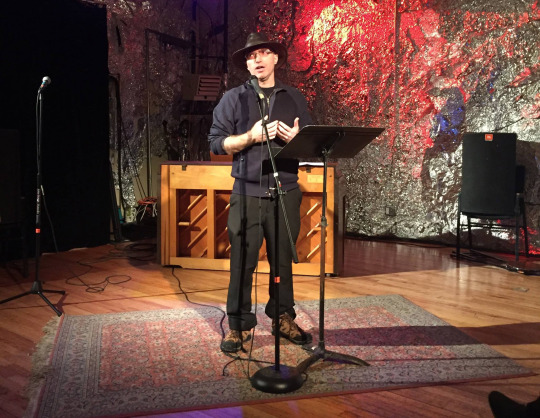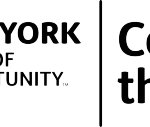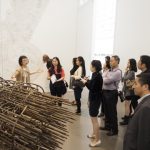Interview: Daniel Gallant, Executive Director of Nuyorican Poets Cafe (Part 2)
“We have been called a buffer against gentrification, and preserving the cultural richness of our neighborhood is one of our top priorities…”
In late August, NYFA Learning’s IAP Intern, Priscilla Son, met with Daniel Gallant, Executive Director of the Nuyorican Poets Cafe, for a feature article in NYFA’s Con Edison Immigrant Artist monthly newsletter. As the two discussed the organization’s mission, diversity, and performance opportunities available for immigrant artists, there emerged a rich and in-depth conversation about being an arts leader in the contemporary creative community, artistic sustainability, and the inevitable effects of gentrification in NYC’s Lower East Side. Feeling that the content would be of particular interests to our arts administrators, we present Part II. (To read Part I of the interview and to learn more about the Nuyorican Poets Cafe, click here.)
NYFA: Publications like The Wall Street Journal say that you’ve grown the Cafe since you became the director in 2008. Can you talk a little bit about that?
DANIEL GALLANT: Sure! When I joined the Cafe in 2008, it was a grassroots organization, run by volunteers. Despite a legacy of artistic excellence, the organization was not in strong fiscal or operational health. There was no full-time staff, and the Cafe’s events were not being promoted effectively. In my first few years as executive director, I boosted our marketing and outreach efforts, grew our programmatic lineup and developed connections with other organizations and with government officials.
Through strategic use of online marketing resources, the Cafe has nearly tripled its revenues and vastly increased its audiences since 2008. We ‘ve also built a lot of positive relationships with government officials, funders, and corporate entities over the past eight years. We’ve collaborated with Google, Chase, Starbucks, BAM, the Brooklyn Museum, Barnes & Noble, Summerstage, City Parks, and other entities on dozens of workshops, performances, and festivals.
Prior to 2008, the Cafe received very little grant money. But in the past few years, we’ve raised nearly $11 million in capital grants to renovate the upper floors of our building. That capital project will boost our programmatic capacity by adding a second performance space, classroom, and office space to our building in the next several years. We’ll be able to serve more than twice as many artists, spectators, and students as we do now, as well as arts organizations that have been displaced by rising rents. We have been called a buffer against gentrification, and preserving the cultural richness of our neighborhood is one of our top priorities for the upcoming renovation.
Since 2008, we have significantly grown our institutional family. Through a number of online and offline efforts, we have connected with hundreds of thousands of fans whose needs and proclivities are directly relevant to our programs. We’ve found real-time ways to reach a younger and more diverse constituency than ever before and to make sure that our programs are responsive to the interests of our audience.
NYFA: How would you describe the Cafe’s audience? As the East Village has changed in recent years, did your audiences change as well?
DG: In New York City, audiences for cultural events are always changing; they’re a microcosm of the protean metropolis. Although we’ve been in the East Village for 43 years, our spectators are younger and more diverse than those at many NYC venues. People tend to frequent our events when they’re new to the city – just starting college, visiting from overseas, or moving to New York from another state. Longtime New Yorkers who seek inclusive, communal and topical arts experiences often visit the Cafe. Our performance, poetry, open mics, and interactive crowd-sourced events appeal to a relatively youthful demographic – spectators who may not have the patience (or the budget) to attend traditional arts events at more upscale venues, but who are drawn to the spontaneous and communal energy at our venue. We see new faces at every event.
So our audiences constantly shift because of the nature of our programming. But it is also true that our neighborhood has changed a lot over the past few decades. If you walk out of the Cafe’s front door and turn towards the west, you’ll see what the neighborhood is becoming – a mix of upscale restaurants, boutiques, and pricey condos. But if you walk east from our building, you’ll see more of the neighborhood’s history: bodegas, community health clinics, older restaurants, and bars still line the streets along Avenues C and D. Many of our regulars who used to live in Alphabet City have been priced out; they’ve relocated to other boroughs or other cities. But despite the changing dynamics of our neighborhood, there are a lot of loyal spectators who visit us from upper Manhattan, the Bronx, Brooklyn, Queens, New Jersey, across the country, and even from overseas. Social media has helped to increase the breadth of our community. Artists and audiences will travel great distances for rewarding and inclusive cultural experiences, and in the last few years, we’ve done an effective job of engaging far-flung fans of spoken word.
NYFA: Do you worry that the Cafe might be pushed out of its neighborhood?
DG: I’m not concerned about whether the Cafe can sustain itself in the East Village because our events attract a broad swath of New Yorkers. Our slams are always crowded and our overhead is low. We own our building and we’re a tax-exempt non-profit entity, so our expenses remain modest. Consistent ticket revenue, grant funds, and other income streams allow us to present innovative artistic work on a regular basis.
But I worry about whether New York City will remain accessible, or even survivable, for many of our constituents – young people of color, young artists of modest financial means, the students and recent graduates who in decades past would have moved to New York to embark on creative careers. This city, which profits so heavily from artistic activities, offers far too few opportunities for rising artists to develop their craft. There is insufficient public and private investment in the next generation of arts practitioners. Financial pressures have a homogenizing effect on the cultural sphere – when incomes don’t keep pace with the cost of living, arts organizations take fewer risks because they can’t afford to offend critics, funders, and audiences. The Cafe is exempt from many of those pressures, but our artists are not. The edgy and experimental work that we encourage at the Nuyo often originates with young artists of color whose financial means are limited. Unfortunately, the economics of this city have become hostile to those artists.
NYFA: You were the recipient of a 2016 Eisenhower Fellowship. How was your trip and what takeaways can you apply to the Cafe?
DG: The fellowship provided a transformative opportunity to broaden my understanding of cultural policies abroad. I visited Spain and Japan this past summer and learned about multiple models for arts funding, arts education, and arts outreach. In both countries, I saw how government investment in the cultural field can pay enormous dividends for local communities. I also discovered limitations to the public benefits conveyed by government oversight of arts entities.
Cultural organizations in the United States would benefit from studying how their European and Asian counterparts leverage public support; lessons gleaned from overseas entities could help US organizations increase arts participation and encourage art creation.
And our nation would do well to embrace a concept that seems widespread in Spain: that art is a public good, and the public interest is served when the government encourages artistic and technological innovation. Societies are healthier and more functional if citizens are allowed the resources and training necessary to develop creative skills.
The Eisenhower Fellowship experience was also relevant to my work with the Cafe because we’re very interested in launching artist exchanges with organizations in Japan, Spain, and other countries. There is a lot of enthusiasm at our venue for performances, discussions, and panels that feature artists from abroad who perform bilingual works or works in translation. Once our building is renovated, we aim to host more programs in our augmented spaces that feature artists and scholars from abroad.
Nuyorican Poets Cafe is located at 236 E 3rd St, New York, NY 10009. If you’d like to learn more about the Cafe, visit their website at www.nuyorican.org.
Daniel Gallant is the Executive Director of the Nuyorican Poets Cafe, as well as a writer, producer, actor, and teacher. Daniel is the recipient of a 2016 Eisenhower Fellowship and an alumnus of National Arts Strategies’ Chief Executive Program. He previously served as the Director of Theater and Talk Programming at the 92nd Street Y’s Makor and Tribeca centers, and has produced dozens of theater, music and charity events at venues including Summerstage, Town Hall, Brooklyn Museum, Joe’s Pub, Abrons Arts Center, and the DR2 Theater. Daniel has been featured in the Wall Street Journal, the New York Times, Crain’s New York, the Daily News, Time Out New York and Voice of America; and on MTV, NBC, NY1, CBS, NPR, Univision, the BBC and other networks. His writing has appeared in the New York Post, Howlround, Shotgun Honey, BK Nation and anthologies from TCG, Vintage Books, and Applause. According to the Wall Street Journal, “Mr. Gallant has exploited expanding social-media tools to grow the cafe from a small, volunteer-led venue best known for weekly poetry events to a thriving arts center with partnerships across the city.” You can follow Daniel Gallant on Facebook, Twitter, or LinkedIn.
Are you currently receiving our free Con Edison Immigrant Artist Program Newsletter? Don’t miss next month’s issue: sign up for free here. Find out more about NYFA’s Immigrant Artist Program (IAP).
Click here to read part one of this interview.
– Interview conducted by Priscilla Son, Immigrant Artist Program Intern
Image: Lucien Zayan, Daniel Gallant at JACK open mic benefit





